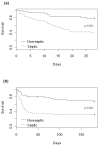Sepsis is a major determinant of outcome in critically ill HIV/AIDS patients
- PMID: 20698966
- PMCID: PMC2945136
- DOI: 10.1186/cc9221
Sepsis is a major determinant of outcome in critically ill HIV/AIDS patients
Abstract
Introduction: New challenges have arisen for the management of critically ill HIV/AIDS patients. Severe sepsis has emerged as a common cause of intensive care unit (ICU) admission for those living with HIV/AIDS. Contrastingly, HIV/AIDS patients have been systematically excluded from sepsis studies, limiting the understanding of the impact of sepsis in this population. We prospectively followed up critically ill HIV/AIDS patients to evaluate the main risk factors for hospital mortality and the impact of severe sepsis on the short- and long-term survival.
Methods: All consecutive HIV-infected patients admitted to the ICU of an infectious diseases research center, from June 2006 to May 2008, were included. Severity of illness, time since AIDS diagnosis, CD4 cell count, antiretroviral treatment, incidence of severe sepsis, and organ dysfunctions were registered. The 28-day, hospital, and 6-month outcomes were obtained for all patients. Cox proportional hazards regression analysis measured the effect of potential factors on 28-day and 6-month mortality.
Results: During the 2-year study period, 88 HIV/AIDS critically ill patients were admitted to the ICU. Seventy percent of patients had opportunist infections, median CD4 count was 75 cells/mm3, and 45% were receiving antiretroviral therapy. Location on a ward before ICU admission, cardiovascular and respiratory dysfunctions on the first day after admission, and the presence of severe sepsis/septic shock were associated with reduced 28-day and 6-month survival on a univariate analysis. After a multivariate analysis, severe sepsis determined the highest hazard ratio (HR) for 28-day (adjusted HR, 3.13; 95% CI, 1.21-8.07) and 6-month (adjusted HR, 3.35; 95% CI, 1.42-7.86) mortality. Severe sepsis occurred in 44 (50%) patients, mainly because of lower respiratory tract infections. The survival of septic and nonseptic patients was significantly different at 28-day and 6-month follow-up times (log-rank and Peto test, P < 0.001).
Conclusions: Severe sepsis has emerged as a major cause of admission and mortality for hospitalized HIV/AIDS patients, significantly affecting short- and longer-term survival of critically ill HIV/AIDS patients.
Figures
Comment in
-
Sepsis as a major determinant of outcome in critically ill HIV/AIDS patients: don't forget acute kidney injury.Crit Care. 2012 Dec 10;16(6):468; author reply 468. doi: 10.1186/cc11870. Crit Care. 2012. PMID: 23228007 Free PMC article. No abstract available.
Similar articles
-
Six-month survival of critically ill patients with HIV-related disease and tuberculosis: a retrospective study.BMC Infect Dis. 2016 Jun 10;16:270. doi: 10.1186/s12879-016-1644-6. BMC Infect Dis. 2016. PMID: 27286652 Free PMC article.
-
Distance from care predicts in-hospital mortality in HIV-infected patients with severe sepsis from rural and semi-rural Virginia, USA.Int J STD AIDS. 2016 Apr;27(5):370-6. doi: 10.1177/0956462415584489. Epub 2015 Apr 29. Int J STD AIDS. 2016. PMID: 25931237
-
Benefit of antiretroviral therapy on survival of human immunodeficiency virus-infected patients admitted to an intensive care unit.Crit Care Med. 2009 May;37(5):1605-11. doi: 10.1097/CCM.0b013e31819da8c7. Crit Care Med. 2009. PMID: 19325488 Free PMC article.
-
Critically Ill Patients With HIV: 40 Years Later.Chest. 2020 Feb;157(2):293-309. doi: 10.1016/j.chest.2019.08.002. Epub 2019 Aug 14. Chest. 2020. PMID: 31421114 Review.
-
Care of Critically Ill Patients with Human Immunodeficiency Virus.Ann Am Thorac Soc. 2020 Jun;17(6):659-669. doi: 10.1513/AnnalsATS.201909-694CME. Ann Am Thorac Soc. 2020. PMID: 32216642 Review.
Cited by
-
Management of HIV-infected patients in the intensive care unit.Intensive Care Med. 2020 Feb;46(2):329-342. doi: 10.1007/s00134-020-05945-3. Epub 2020 Feb 3. Intensive Care Med. 2020. PMID: 32016535 Free PMC article. Review.
-
Severe infection increases cardiovascular risk among HIV-infected individuals.BMC Infect Dis. 2019 Apr 11;19(1):319. doi: 10.1186/s12879-019-3894-6. BMC Infect Dis. 2019. PMID: 30975092 Free PMC article.
-
Sepsis as a major determinant of outcome in critically ill HIV/AIDS patients: don't forget acute kidney injury.Crit Care. 2012 Dec 10;16(6):468; author reply 468. doi: 10.1186/cc11870. Crit Care. 2012. PMID: 23228007 Free PMC article. No abstract available.
-
The innate immune response in HIV/AIDS septic shock patients: a comparative study.PLoS One. 2013 Jul 11;8(7):e68730. doi: 10.1371/journal.pone.0068730. Print 2013. PLoS One. 2013. PMID: 23874739 Free PMC article.
-
Six-month survival of critically ill patients with HIV-related disease and tuberculosis: a retrospective study.BMC Infect Dis. 2016 Jun 10;16:270. doi: 10.1186/s12879-016-1644-6. BMC Infect Dis. 2016. PMID: 27286652 Free PMC article.
References
-
- UNAIDS/WHO. AIDS Epidemic Update 2009. http://data.unaids.org/pub/Report/2009/2009_epidemic_update_en.pdf
Publication types
MeSH terms
LinkOut - more resources
Full Text Sources
Medical
Research Materials


